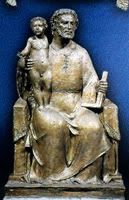I started posting about China a few months ago, since I saw a trend of undue deference that news outlets were giving the country (and people). There seems to be a consensus amongst journalists and politicians that "China is rising" and that it is a force to contend with. No one mentions the third-world level of subsistence that many Chinese live in, and the huge numbers immigrating every year to an accommodating Canada. Of course, once in Canada, it is not clear how these Chinese will contribute to Canadian, let alone Western, values and how much of their ancestry and cultural baggage they will force upon the unsuspecting.
As I wrote in a previous post, I spent several years teaching Chinese immigrants, who are meant to be the cream of the immigrant crop. The Canadian "landed immigrant" criteria requires that they demonstrate post-secondary level education, and that they bring with them substantial sums of money ($200,000, last I checked). Chinese and Korean immigrant are able to provide these criteria, more so than African or Latin American immigrants. Therefore, Canada is more than willing to accept and accommodate them.
I think this desire to accommodate Chinese immigrants goes beyond economics, politics or even education. I think part of it is a natural Western curiosity towards different peoples, who appear to have interesting things to offer.
This has been the case at least in art in the past, and especially in the twentieth century with the impressionists. Van Gogh and Monet were influenced by Japanese florals, and even the idea of flat surfaces (removing perspective in paintings, a method invented during the Renaissance) was an Asian influence in Impressionism and current art.
Currently, now that this Other is entering Western, and especially North American, shores, he should not appear too different. Perhaps it is the lighter skin of East Asians (Chinese and Koreans) that makes them more acceptable than Africans, although I personally disagree with this and find Chinese physiognomy as alien as any. But I think what modern Westerners do see is this superficial similarity.
There is also the much proclaimed "smart Asian" stereotype, with the high I.Q. But my brief personal interactions with East Asians, which includes Koreans, has always demonstrated the fallacy of the Asian with the high I.Q. For all the smarts and brains, I found they lacked inventiveness and imagination, which is a part of I.Q. measurement that is generally neglected. I originally come from a background of research which requires processing information (data) to come up with interesting and inventive questions to solve scientific problems. Later on, I switched to art and design. Imagination and invention have always been important in my world view.
But perhaps most important of all, current cultural opinion goes to great lengths to bridge differences. Liberalism teaches us that there are no differences between peoples, there is no Other, and contrary to our primordial nagging which tells us that there is indeed one, we must collide and cohabit with him in order not to participate in the world's worst crime: that of discrimination. Thus, we suppress all these feelings and accumulated knowledge and wisdom, and invite the Other right into our own back yards.
These impressions of similarity, or to be more precise, sameness, are exacerbated by modern media, which brings the Other to us in life-like forms through movies and television. But we (or our artists), God-like, recreate him in our own image, to suite our whims and fancies. And these fancies include all kinds of convoluted beliefs and superstitions (i.e. the evils of discrimination), to assure us that "we are the world." And the smart Chinese aggressively use modern communication systems to further this image created by the West, and which suites their agenda of infiltrating, at least economically, Western countries and institutions. One of the ways it it doing so is by allowing a tremendous out-migration of its population to infiltrate the West, or at least the countries which allow easy entry. China understands that ultimately, especially in a rabid multicultural society like Canada, loyalties will almost always return to ethnicity.
No-one digs too deep to uncover and understand these realities. And since when has liberalism been keen on self-reflection and analysis? The truth may just be too hard to bear. On a fundamental, evolutionary level, white men who abandoned their white women for Chinese women (the percentage for white men/Chinese women is extraordinarily high here in Canada) now have half Chinese off-spring who identify more with their mothers' ancestry than with their father's Canadian. This became apparent to me during my art studies years, when my Chinese and half-Chinese classmates consistently and constantly looked toward Chinese "influences" to do their art projects.
How long before any can "Stand on Guard for thee" with hand on heart, during a national ceremony? Not only are we accepting alien peoples, but the leaders of the society, the white men
Again, I had a shocking personal experience (posted here) where Chinese immigrants I was teaching English to refused to stand (or even sing) the Canadian national anthem, where the strong words "stand on guard for thee" now have no meaning for the thousands still pouring in to Canada.










